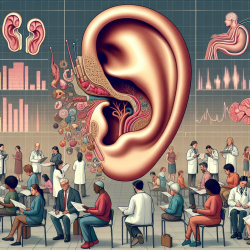The intricate relationship between our auditory system and the environment is a subject of continuous research, particularly in the context of acoustic trauma. A deeper understanding of this relationship not only enlightens us about the anatomical and physiological consequences of acoustic trauma but also opens new avenues for therapeutic interventions. The commentary by R. V. Harrison on "Anatomical and Physiological Consequences of Acoustic Trauma: A Short Review" provides crucial insights into the effects of noise exposure on the cochlea and its implications for therapy and rehabilitation.
One of the key takeaways from Harrison's work is the significance of outer hair cells in the cochlea. These cells are crucial for the sensitivity and frequency selectivity of hearing. Damage to these cells, particularly the cilia, can lead to significant hearing loss. This understanding prompts a shift in therapeutic approaches, emphasizing the protection and health of these cells to prevent or mitigate hearing loss.
Furthermore, the commentary sheds light on the metabolic factors influencing the cochlea's response to noise trauma. Studies have shown that conditions like hypothermia in the cochlea or the application of ascorbic acid can reduce the damaging effects of noise exposure. This suggests that metabolic interventions could be a viable path for protecting the cochlea from acoustic trauma, offering a new strategy for therapists and audiologists.
For practitioners, the implications of these findings are profound. By incorporating this advanced understanding into their practice, therapists can better design interventions that protect against or rehabilitate hearing loss due to acoustic trauma. This might include strategies focusing on metabolic health or the direct protection of outer hair cells.
Additionally, the commentary encourages further research into the biochemical and intracellular changes in outer hair cells following noise exposure. This "view from within" is essential for developing more effective therapeutic techniques and improving the design of amplification systems to aid those with hearing impairments.
Understanding the reduced tip-to-tail differences in the frequency tuning curves (FTCs) of impaired listeners, as discussed by Harrison, also has practical applications. This reduction is associated with poor speech discrimination ability in noisy environments, highlighting the need for targeted therapies that address this specific impairment.
In conclusion, Harrison's commentary not only expands our understanding of the anatomical and physiological effects of acoustic trauma but also serves as a call to action for practitioners. By integrating these insights into therapeutic practices, we can enhance the effectiveness of treatments for hearing loss and improve the quality of life for those affected. As we continue to explore the inner workings of the cochlea and the impact of noise exposure, the horizon for therapeutic interventions broadens, promising better outcomes for individuals with hearing impairments.
To delve deeper into this fascinating subject and explore the detailed findings of Harrison's commentary, please follow this link: Peer Commentary on "Anatomical and Physiological Consequences of Acoustic Trauma: A Short Review" by R. V. Harrison.










